Which Statement About the Esterhãƒâ¡zy Family Is Not True?
Posts Tagged: CSO
Chicago Symphony Extras: Missa Solemnis
The Dedicatee
In many ways, we who relish the music of Beethoven's late period owe a tremendous debt of gratitude to an otherwise insubstantial member of the minor dignity. Equally the sixteenth child of the Emporor Leopold II, Archduke Rudolf of Austria could be pretty well certain that he was not going to inherit his father's championship, state, or fortune; every bit such, he did what and then many younger sons of the nobility did and went into the priesthood, condign archbishop (and then Fundamental) of Olmütz in 1819.
Rudolf seemingly got a pretty sweet deal, considering while his older blood brother went down in history for losing his empire to Napoleon, Rudolf began studying pianoforte and composition with the most famous composer in Europe, Ludwig van Beethoven.
Though Beethoven complained about his obligation to requite the Archduke daily lessons (sometimes lasting more than two hours), the two grew to be friends at a time when Beethoven needed friends nigh. Napoleon's wars had caused many of Beethoven's most reliable patrons to carelessness regal Vienna for fearfulness of losing their heads. Beethoven had insulted, cheated, or otherwise alienated the majority of the princely families who remained in their Austrian palaces.
The Lawsuit
Information technology wasn't simply other people's families who Beethoven alienated. The expiry of Beethoven's younger brother Kaspar in 1815 precipitated the ugliest, most productivity-stifling upshot in his life: the fearsome custody battle he waged against his sister-in-law Johanna for the guardianship of his nephew, Karl.
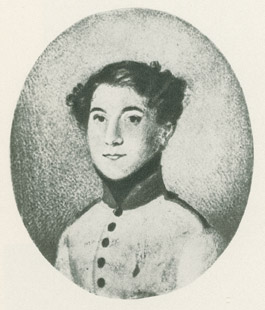
Beethoven's initial reaction to his brother'southward expiry was to accuse his sister-in-law of murder by poisoning. When this turned out to be a expressionless terminate, he began the battle for sole custody of Karl. He won decisive early victories against his sister-in-law in the Landsrecht, the court of the nobility. Beethoven'due south fates reversed in 1818 when he accidentally permit skid in the course of a deposition that the "van" in his Dutch surname was not equivalent to the Germanic "von" which automatically conferred dignity. Every bit such, his case was sent down to commoner'southward court, which was much more sympathetic to Johanna van Beethoven's cause.
Though Beethoven finally won custody over Karl, his insane, possessive love took a perilous evinced itself again a few years afterwards when the teenage male child attempted to take his own life with a pistol on a loftier hill overlooking Beethoven's summer home.
The 2nd Mass
Though he sometimes played around with themes for decades before turning them into full pieces, the iv years it took Beethoven to complete the Missa Solemnis (1819 – 1823) represented the longest sustained menses of work Beethoven spent on any single limerick. Strangely for a composer who often went back and along between projects, Beethoven did non work on private movements and sections simultaneously; he composed it from showtime to end, beginning with the Kyrie and ending with the Agnus Dei.
This was in fact Beethoven's 2nd setting of the traditional Latin mass text, having written his first in 1807, the bottom known Mass in C. Aside from obvious stylistic differences, the main difference between the 2 works is length: whereas the Mass in C clocks in at a respectable 45 minutes, performances of the the Missa Solemnis commonly last well-nigh twice as long.
As such, Beethoven languished considerable attending on every word and phrase of the Latin text. [N.B. the "Kyrie" is the only role of the Roman mass non in Latin; it's in Greek.] Allow's have as an example his setting of the phrase qui sedes advertizing dexteram patris ("who sits at the right hand of the father"). Here'southward how Beethoven set it in the earlier Mass in C:
And here it is magnified in every dimension in the Missa Solemnis:
The Difficulties
Beethoven rarely took into account the technical limits of the musicians he was writing for. He was as hard and irascible a composer as he was a human being, peculiarly when it came to writing for singers. The Missa Solemnis is arguably the nigh daunting challenge in the choral repertoire. It's not exactly piece of cake for the soloists or the orchestra either.
Hither is an excellent operation of the Gloria given by the august London Symphony Orchestra and Chorus under Sir Colin Davis. It's loftier social club music-making, merely you lot'll still hear the sopranos straining, the orchestra struggling, and the soloists straying from their ideals of intonation. And yet the overall effect is, well, glorious:
CSO Addenda: Trumpet Treasures
Since the trumpet is the major feature of this week'southward concert, which features the bright playing of CSO principal trumpeter Christopher Martin, I thought we might take a further wait at the history of the musical instrument and why there are so very few trumpet concertos in the repertoire.
Ancient Trumpets
Trumpet were in use at to the lowest degree three,500 years ago, and from there earliest days, they had a regal association. How practise we know? Well, two of the earliest trumpets that we have come from the tomb of King Tut. They were played on a special circulate by the BBC in the 1930's:
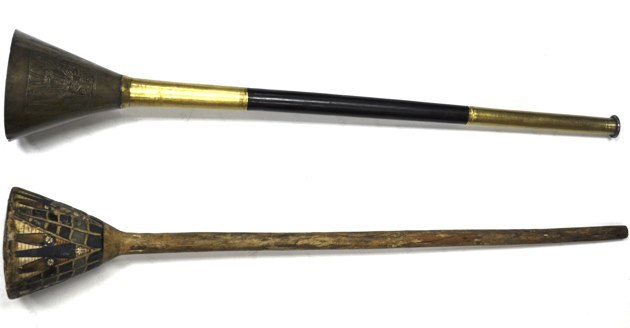
Find that each of those trumpets sounds most three or four notes. This is an inherent physical property of the trumpet – and of whatever vibrating body, really – that without recourse to keys or valves, it is limited to the notes of the harmonic series. Then for an awfully long time, trumpets – even of the European variety – were limited to sounding virtually five notes with whatever consistency. Hence the very familiar sound of the trumpet fanfare.
Clarino Playing
Around the time of Bach, notwithstanding, some very diligent players developed a technique known as "clarino" playing. This takes advantage of the fact that the college up you play on the trumpet, the more notes go available. The ascent in pitch is a perilous ane though: the higher the note, the easier it is to crevice, slip, or outright miss. The exercise of clarino playing lasted from peradventure the High Renaissance to the High Baroque, and information technology is a fortuitous fact of history that it coincided with the lifespan of one Johann Sebastian Bach.
Because of this, we are left with such gems as the 2d Brandenburg Concerto (check out the 3rd movement which starts at near 3:40):
Nota bene, the group playing higher up is chosen the Freiberger Barockorchester, a so-called "period instrument" ensemble. Nevertheless, there's a dead requite-abroad that the trumpeter here is playing on a modern recreation of a trumpet from Bach'south fourth dimension rather than an original musical instrument. Do you find fiddling holes that the trumpeter covers with his fingers while he plays? Those little finger holes are a modern improvement that allow the trumpeter to play the high notes more in tune, and they are not an original feature of the trumpets of Bach's time.
Now, make no mistake – the bearded admirer above is a complete virtuoso, and he is in fact using the very same clarino technique that was used by the players of Bach's time. This little enhancement simply makes the notes sound more than mellifluous to the ears of the Auto-Melody Generation.
[Full disclosure: There is significant debate about just what sort of instrument Bach composed this role for. Some people recollect information technology was a written for a more than horn similar musical instrument. Toscanini, for some reason, had it played on a piccolo clarinet.]
The Keyed Trumpet
The first step towards the modern valve trumpet was an try called the "keyed trumpet", invented by (or peradventure, for) the great Anton Weidinger, trumpeter of the court orchestra of Esterházy family, who also happened to employ ane Franz Joseph Haydn. And so it'due south no surprise that Haydn himself wrote the start major piece for this new instrument, his Trumpet Concerto in Eastward-flat Major. Incidentally, this is likewise the first major concertate piece for the trumpet that is withal played today (excepting Bach'south 2d Brandenburg Concerto).
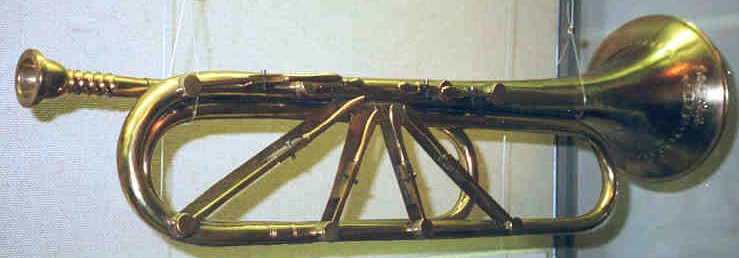
[Like all esoteric brass instruments, the keyed trumpet has a major post-obit in U.k.. This web site is sort of amazing – whoever wrote the text of the front page did everything in his or her power to brand you follow the link to the residue of the site.]
The keyed trumpet never gained traction, despite the concertos written for Weidinger by Haydn and his successor at the Esterházy court, Johann Nepomuk Hummel. The musical instrument was said to have sounded like a "demented oboe". The English trumpeter Crispian Steele-Perkins, one of the few contemporary champions of the instrument, does at least as well every bit that in his recording of the Haydn Concerto:
The Cornet
The modern trumpet is actually an amalgamation of the erstwhile trumpet and the piston cornet. The cornet is a slightly obsolete instrument now – most listeners can not distinguish its sound from that of the modern trumpet. Earlier in the past century though, before trumpets were regularly made with valves, the cornet was a highly prized virtuoso instrument. Hence the dazzling solo that Igor Stravinsky wrote for it in his 1911 ballet Petrushka:
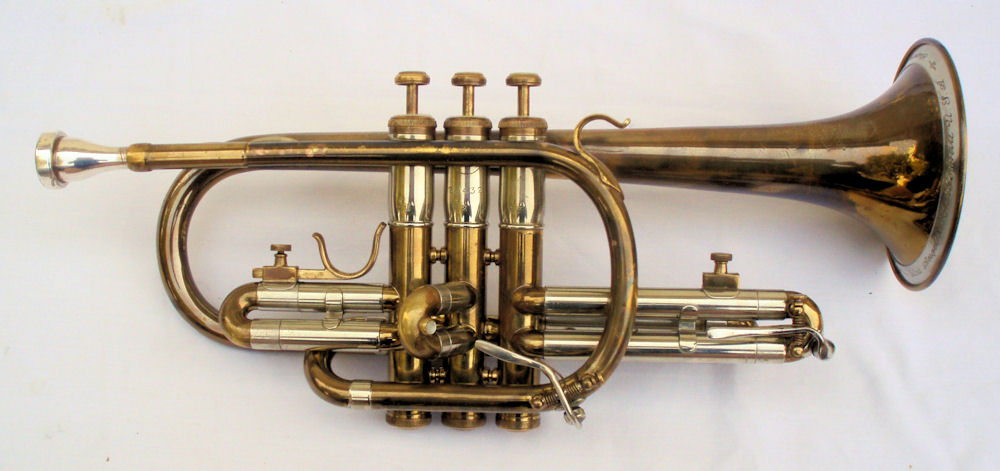
CSO Addenda: Golijov, Sibelius, Shostakovich
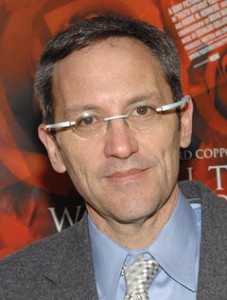
Sidereus
Osvaldo Golijov is the composer of such blockbuster classical hits every bit The Dreams and Prayers of Isaac the Blind and the toe-tapping Pasión según San Marco:
Mr. Golijov's pieces often have more the flavor of an ethnomusicological exploration, which makes a sure amount of sense for a composer of Argentinian nascency who grew up on klezmer and tango and who has also lived in Israel and the U.Southward. [Although, is information technology really ethnomusicological if information technology's actually your ethnicity? Discuss.]
Anyone who attended Thursday's lecture was privy to insights from the work'due south dedicatee, Mr. Henry Fogel. Boosey & Hawkes has provided an as enlightening interview with the composer nigh the genesis of the work. You can heed to the piece of work online in a performance conducted by Mei-Ann Chen (who gave the première in October 2010 in Memphis) with the New England Conservatory Philharmonia. As well of note is Mr. Golijov'south growing filmography since becoming the get-to composer of Francis Ford Coppola.
Lest at that place be any confusion, the title of Mr. Golijov's latest work, Sidereus, is in no fashion meant to sound like an hilarious mispronunciation of the next composer on the program.
Jean Sibelius (1865 – 1957)
Violin Concerto in D pocket-sized, Op. 47 (1903, rev. 1905)
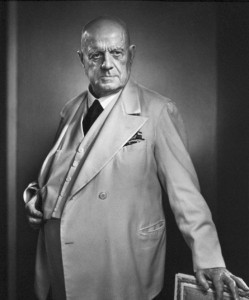
Sibelius' violin concerto is far and above my favorite work in the genre, and i of my favorite works by the composer. In fact, it's one of the first pieces that got me into classical music. You can view an introduction to the work hither past the violinist Ida Haendel, who actually received a alphabetic character of appreciation from Sibelius afterward he had heard her performance of the work, and whose Wikipedia entry actually says the following:
She has the reputation of existence as accomplished and brilliant a violinist equally Yehudi Menuhin and Isaac Stern; just has said that had she been more photogenic, she would take been as famous.

Ida Haendel
Yehudi Menuhin and Isaac Stern, two violinists who Ida Haendel was not as bonny as
People sometimes said the same thing about Sibelius himself, but never to his face up (run into above).
But seriously folks, if you lot're really into the Sibelius concerto, information technology's worth your 10 bucks to invest in Leonidas Kavakos' recording of the 1903 and 1905 versions of the piece of work. He is still the only creative person to record the 1903 version, due to the Sibelius family unit's wishes, which is pretty impressive. He is also way, manner hotter than Ida Haendel.
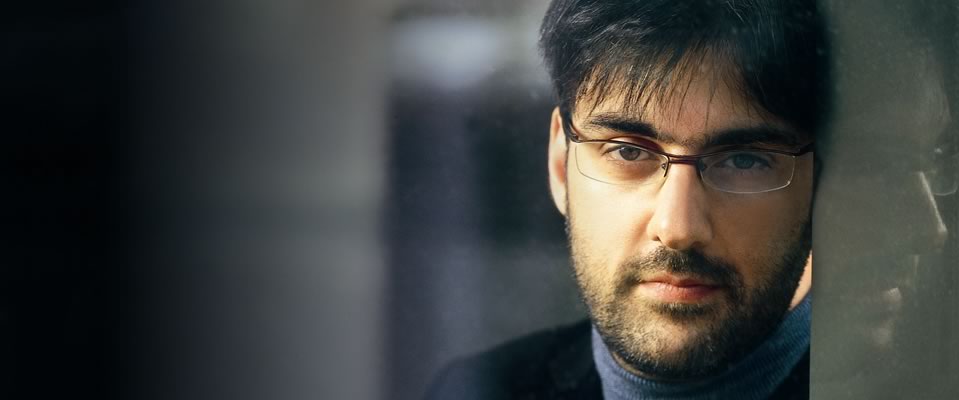
You'll become to hear the intricate, Bach-similar second cadenza that Sibelius afterward cutting from the start movement of his concerto:
amongst many other interesting tidbits.
Dmitri Shostakovich (1906 – 1975)
Suite from Lady Macbeth of the Mtsensk District
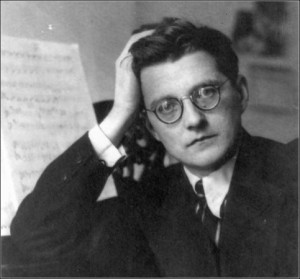
OK, first of all, if you're annihilation similar me, yous've ever wondered only where IS the Mtsensk Commune. It's here:

The residual of this word I'm gonna cut and paste from my March four, 2010 mail about Shostakovich's Symphony No. 11:
Shostakovich's troubles with the authorities began in the twelvemonth 1936, at which betoken Joseph Stalin, eager to send a message to the artistic community, denounced Shostakovitch’south opera Lady Macbeth of the Mtsensk District as immoral and anti-soviet. Let’southward sentinel a bit of the opera and see if we can spot anything that Stalin may have found objectionable. Remember to wait very closely now:
At first glance, information technology looks pretty tame, but that Stalin always had a fine eye for detail. Anyhoo, that led to this very famous headline from the Soviet newspaper Pravda:
which roughly translates to “Muddle instead of Musicâ€, and which began a nightmarish twenty year period of heavy government repression and scare tactics aimed at keeping Shostakovitch in line.
I’d like to recommend two more valuable resources pertaining to Shostakovich’s music and life:
The first is the sound guide to chapter 7 of Alex Ross’s astounding book, The Rest is Noise. Even if yous haven’t read the book or don’t have a copy handy, the sound guide gives you lot a nice synopsis of the chapter on music in the 1930′south and 40′southward USSR.
The second is an article by everybody’south favorite Slovene Marxist-Lacanian-psychoanalytic philosopher, Slavoj Žižek, entitled “Shostakovich in Casablanca“. In this article, Žižek compares Soviet repression of classical music to the Hollywood Hays code, in terms of what the censors expected and how an creative person was meant both to abide by the code and simultaneously to circumvent it. He posits that Shostakovich plant any success he could with the Soviet regime considering he understood this Janus-faced censorship, whereas Prokofiev just couldn’t effigy it out.
Sins sartorial
Readers of my web log will know that I was simply in Chicago this past weekend giving talks for the CSO's Rachmaninoff/Shostakovich concerts. What they won't know, unless they really attended the concerts themselves, and what I am committed to exposing right now, is that the soloist, i "Kirill Gerstein", showed up wearing the least appropriate attire possible. Encounter below:
Do y'all see That, what he is wearing in that photograph? Yeah that, THAT verbal outfit (OK fine, plus a blackness suit jacket) is exactly what he wore to play a concerto with the Chicago Symphony Orchestra. No tie, no tails, just all black, open up-collar. Many of Mr. Gerstein's bios mention that he has extensive experience in jazz every bit well equally classical music. Well, if that exist true, he should sure every bit hell be able to tell the difference between a cocktail lounge and the stage of Orchestra Hall!
I've ranted about men's fashion in the classical music industry many times before, and certainly Mr. Gerstein is not the only offender. Mr. Gerstein is but representative of a larger problem, namely that soloists and conductors seem to retrieve that their individuality stems from their wardrobe rather than their musicianship. And maybe with some of these artists, that is the example. But look at our nifty forbears in the field:
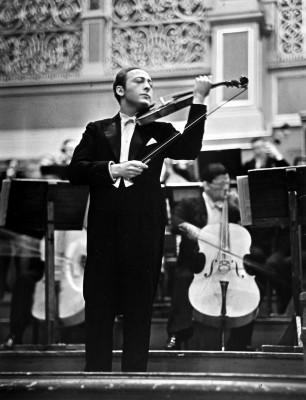
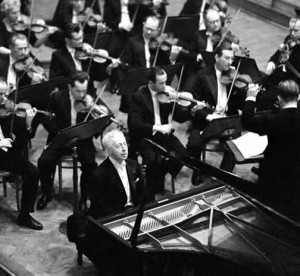
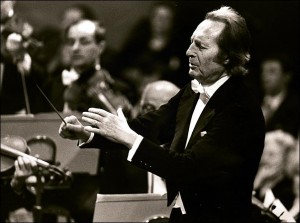
Mssrs. Heifetz, Rubinstein and Giulini were all perfectly content to clothes in uniform. And would we say that these gentlemen were lacking in private style? Quite to the opposite! They each exuded way and grace and they were positively dripping with musicality. And yet, similar other keen performers of yesteryear, these men were perfectly content to brand their public statements with their music rather than with their wardrobe.
When conductors and soloists practise dress in uniform with the orchestra, information technology sends an important message to the members of the ensemble: we're in this together. Information technology shows the orchestra members that you are not and so big-headed that you must take some vulgar costume to describe attention towards yourself – rather, you are prepared for the exalted business organisation of making music. Yous are willing to bide past the same code as the balance of the musicians in front of you lot in order to share in this experience.
And to the Charlie Roses of the world: looking purposefully unkempt (i.e. CR's infamous un-buttoned/cuff-linked shirt sleeves) takes just equally much attempt as looking presentable. We're on to you.
Men of the musical world: glam it up! GLAM IT Up!!!
Mr. Gerstein: on behalf of ticket-holders everywhere, when we pay upwards of $100 both to hear and to come across you perform, we expect you to look presentable. Put on a tie for goodness' sake.
CSO Addenda: Rachmaninoff and Shostakovich
Every bit is usually the case when I prepare my pre-concert lectures at the Chicago Symphony, I cease up with way more information than I can share in the 30 minutes allotted. Here are some extra insights on the March 4-vi concerts. Welcome CSO patrons!
Rachmaninoff Pianoforte Concerto No. two in C minor
Any piece with every bit many gorgeous tunes as Rachmaninoff's 2d Piano Concerto is just request to be pillaged for its melodies, and thus we have Wikipedia'south list of several works as existence derived from or inspired by this piece. Permit's encounter if nosotros concord with them:
1st movement
Frank Sinatra's "I Think of You"
Here'south the Rachmaninoff:
OK, no statement in that location. [BTW, does anyone else agree that the Hollywood session player in Nelson Riddle's orchestra sounded WAY better on the horn solo than the principal in the New Philharmonia Orchestra?]
The Wik then goes on to list no fewer than four songs by Muse which supposedly quote the beginning movement:
1. "Space Dementia":
which is pretty manifestly an homage to the opening of the concerto:
[BTW, does everyone concord that Moshe Atmon is a way amend pianist than the guy from Muse?]
and so #two. "Collywobbles & Hurricanes
and #3. "Ruled past Secrecy"
which both quote the cease of the movement's kickoff theme:
Every bit for "Megalomania", the closest matter I could find was this:
which I would hardly telephone call a "quote", simply does share certain melodic and harmonic ideas with the concerto.
second movement
Unfortunately it can't all be Frank Sinatra and English alt-prog-fine art rock. When it comes to the gorgeous 2d movement,
we go from the semi-decent:
(which has a questionable connection to the original),
to the bad:
to the truly, spine-cringingly, atrocious:
Interestingly, that terminal extract is nothing but the original Rachmaninoff with some cheeze-fried vocals laid on tiptop. It comes out the absolute worst because it puts the original composition in such stark relief.
3rd movement
Let'south cleanse our ears, shall we, with some more class-A Frank:
which, it hardly needs proverb, is this:
Shostakovich Symphony No. 11 ("The Year 1905")
As it's title would indicate, Shostakovich took the 1905 Russian Revolution as the field of study of his 11th Symphony. Theories abound equally to other, hidden meanings behind this work (specially the 1956 Hungarian insurgence against the communist authorities).
Perhaps the well-nigh widely known piece of art concerning the 1905 Revolution is Sergei Eisenstein's landmark silent moving-picture show from 1925, Battleship Potemkin. Below is the much acclaimed "Odessa Steps" sequence.
(Please note that this clip contains music from Shostakovich'due south 11th and 5th symphonies – not the original score by Meisel which was lost and has since been restored.)Â The whole movie can be viewed hither.
The Symphony "1905" was a turning point for Shostakovich — he had outlived Stalin and was at present in the position to regain some sense of sanity and ease, if not total official favor. His troubles with the government had begun in the twelvemonth 1936, at which betoken Joseph Stalin, eager to send a bulletin to the creative community, denounced Shostakovitch's opera Lady Macbeth of the Mtsensk District as immoral and anti-soviet. Let's watch a scrap of the opera and see if we can spot anything that Stalin may have found objectionable. Recollect to expect very closely now:
At showtime glance, it looks pretty tame, merely that Stalin ever had a fine eye for particular. Anyhoo, that led to this very famous headline from the Soviet paper Pravda:
which roughly translates to "Muddle instead of Music", and which began a nightmarish 20 year period of heavy authorities repression and scare tactics aimed at keeping Shostakovitch in line.
I'd like to recommend two more valuable resources pertaining to Shostakovich'southward music and life:
The offset is the audio guide to chapter 7 of Alex Ross's astounding book, The Rest is Noise. Even if you lot oasis't read the book or don't have a copy handy, the sound guide gives you a squeamish synopsis of the affiliate on music in the 1930's and 40's USSR.
The 2d is an article past everybody's favorite Slovenian Marxist-Lacanian-psychoanalytic philosopher, Slavoj Žižek, entitled "Shostakovich in Casablanca". In this commodity, Žižek compares Soviet repression of classical music to the Hollywood Hays code, in terms of what the censors expected and how an artist was meant both to bide by the code and simultaneously to circumvent information technology. He posits that Shostakovich found whatever success he could with the Soviet regime considering he understood this Janus-faced censorship, whereas Prokofiev just couldn't figure it out.
That's all the extra goodies for this concert serial. Feel free to leave a annotation in the comments section to share your opinions of the concert! Also, feel gratuitous to peruse the residual of my site at your own risk, in full awareness that futurity, the Chicago Symphony has cipher to do with the content on this site…
Source: https://www.willcwhite.com/tag/cso/
Belum ada Komentar untuk "Which Statement About the Esterhãƒâ¡zy Family Is Not True?"
Posting Komentar